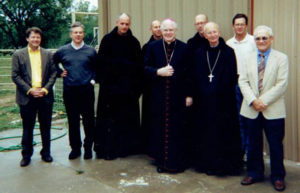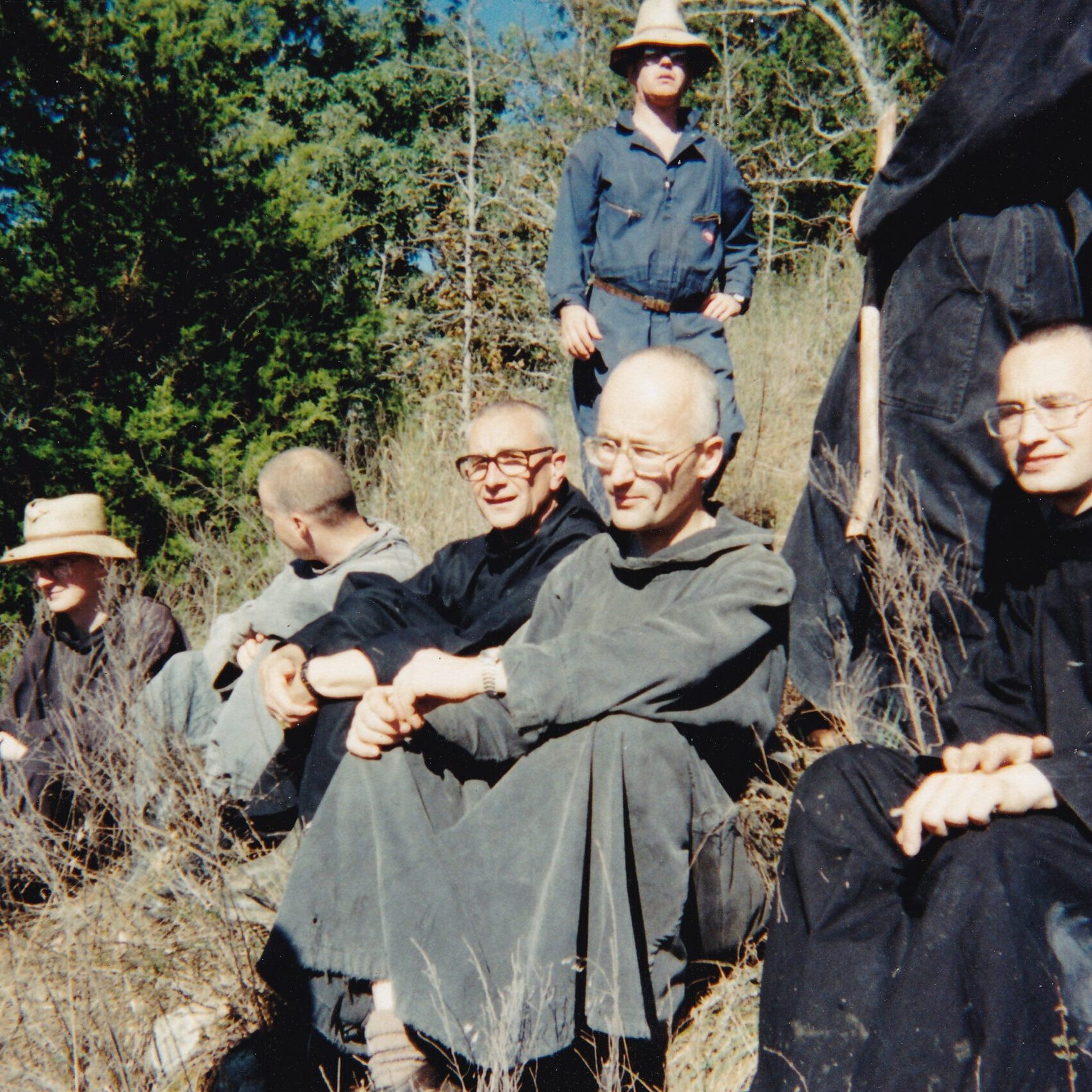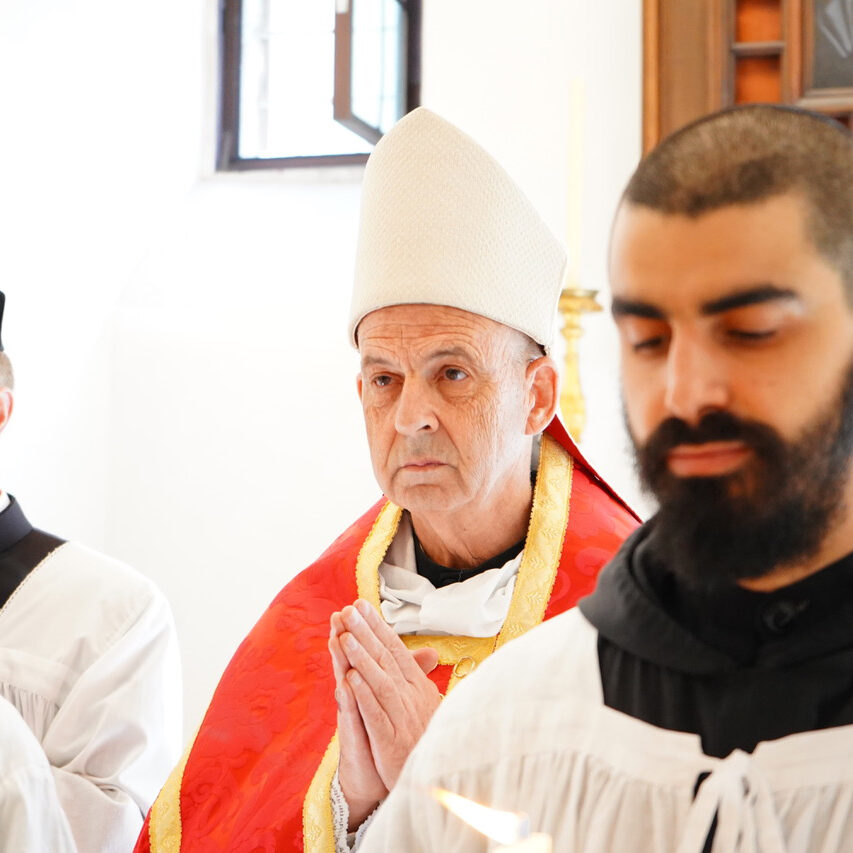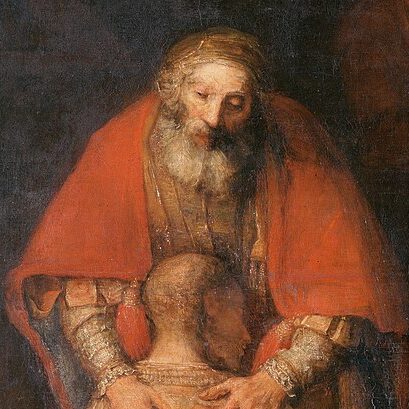Dear Friend of Clear Creek Abbey,
On August 23rd a very close friend of Our Lady of Clear Creek Abbey was suddenly and tragically swept away from us. We will never be quite the same. Mark Costello was part of the Clear Creek adventure from the very start and ever faithful. The following excerpt is taken from the homily it was my privilege to offer at the solemn requiem mass for him in Edmond, Oklahoma on August 29th.
 “It could be said,” wrote Pope Saint John Paul II, “that human history is marked from the very beginning by the limit God the Creator places upon evil.” The remark is profound. It echoes something the great Saint Augustine once said:
“It could be said,” wrote Pope Saint John Paul II, “that human history is marked from the very beginning by the limit God the Creator places upon evil.” The remark is profound. It echoes something the great Saint Augustine once said:
You are beset by trials, are you, and shaken by all the things in this world that offend you, even though you have taken your stand on God’s gracious promises? But even these troubles can do you no harm. Their limits have been imposed on them by the Lord, because the sea is his. This world is the sea, but God made the sea too, and its waves can rage only as far as the shore, which he has assigned to it as its boundary. There is no temptation to which the Lord has not set a limit. Let temptations come, then; let troubles come; you are being finely wrought by them, not wrecked.
This idea of God having set a boundary to evil, the idea that, in fact, Divine Mercy is precisely that limit on evil, as the same holy pontiff also said, goes with another important principle: God, who is almighty, could stop all evil should He so choose, but chooses rather, sometimes, to allow it. Why? For one purpose and one purpose only (He can never want evil): so that a greater good might come out of this evil.
Sometimes, however, we simply see no good emerging from a tragedy: we wonder where was that limit God was supposed to put on evil? It seems as if a massive tidal wave, a moral tsunami, has washed us away. As we mourn today the passing of Mark Costello, of Mark the statesman, the businessman, of Mark the devoted husband and father, of Mark the faithful Catholic Christian, of Mark the friend and brother of monks—the friend of so many—we have been washed away, and we are swimming for shore.
In the Roman Catholic liturgical calendar today is the Feast of the Passion or the Beheading of Saint John the Baptist. That too, as we read about it in the Gospel, was the brutal killing of a good man for no reason. At the time it must have seemed like an unbearably sad event that could be of no good to anyone. But as the life of the Church went on, the witness of this man, of this prophet, of this saint, filled the Church and the world with a precious light that has inspired countless generations of human beings. Through the witness of Saint John the Baptist God brought good out of evil. Where the waters of evil abounded for a moment, with God’s permission, the work of grace “super-abounded,” and evil was driven back, more than ever, behind its limit, like the tidal wave back to the shore. Divine Mercy, Divine Love, you see, had had the last word.
The link between Mark Costello and my monastic community located near Tulsa goes back many years. Like several other young men at the University of Kansas in the 1970s and early 80s, he became interested in a rather unusual project, one involving some American students pursuing vocations to the religious life in an ancient French abbey. Like our archbishop here as a matter of fact, Mark first visited the French abbey during a “year abroad” program in Ireland in 1976. Although he did not think he had a vocation to become a monk, Mark did come back for another visit to the French abbey and kept contact over the years.
Having married his wife, Cathy, and settled in his native Oklahoma, Mark was many years later one of the people most instrumental in arranging for the American monks in France to come back to the United States in 1999. From the very start, he and his family accompanied the new monastic community established in the Tulsa diocese in all its stages of development until the present day, often brainstorming with the monks and with his friends about how to help on the material and administrative levels, as these things are less familiar to monks. The Costellos have been the best of friends for our abbey. . . .
In the end there remain the mystery of evil and the mystery of Divine Mercy. . . In a few weeks, the Catholic Church will begin a special Holy Year of Divine Mercy as proclaimed by His Holiness Pope Francis. May that year bring an abundance of mercy to the contemporary world, where such evil seems to be overflowing its banks, especially with regard to the precious reality of the Family. Mark Costello must be seen as a kind of martyr of the Family, as he fell victim while doing his utmost to reach out to a deeply disturbed son. On the face of it his efforts seem utterly to have failed. But then again, so did Our Lord’s in all appearance as He died on Calvary, the place of execution of criminals, the place of human failure. We know by Faith that in the end Divine Mercy will prevail; that the waters of evil will find their boundary; that the light will win. There is our path forward. After death there is the Resurrection of the Dead, that gentle and final revenge of God. After hatred there is love, the loving, healing revenge of Divine Mercy, the firm shoreline God places on the sea of evil.
Holy Mary, Mother of God, pray for us sinners now and at the hour of our death. Amen.
+ br. Philip Anderson, abbot
Dear Friend of Clear Creek Abbey,
On August 23rd a very close friend of Our Lady of Clear Creek Abbey was suddenly and tragically swept away from us. We will never be quite the same. Mark Costello was part of the Clear Creek adventure from the very start and ever faithful. The following excerpt is taken from the homily it was my privilege to offer at the solemn requiem mass for him in Edmond, Oklahoma on August 29th.
 “It could be said,” wrote Pope Saint John Paul II, “that human history is marked from the very beginning by the limit God the Creator places upon evil.” The remark is profound. It echoes something the great Saint Augustine once said:
“It could be said,” wrote Pope Saint John Paul II, “that human history is marked from the very beginning by the limit God the Creator places upon evil.” The remark is profound. It echoes something the great Saint Augustine once said:
You are beset by trials, are you, and shaken by all the things in this world that offend you, even though you have taken your stand on God’s gracious promises? But even these troubles can do you no harm. Their limits have been imposed on them by the Lord, because the sea is his. This world is the sea, but God made the sea too, and its waves can rage only as far as the shore, which he has assigned to it as its boundary. There is no temptation to which the Lord has not set a limit. Let temptations come, then; let troubles come; you are being finely wrought by them, not wrecked.
This idea of God having set a boundary to evil, the idea that, in fact, Divine Mercy is precisely that limit on evil, as the same holy pontiff also said, goes with another important principle: God, who is almighty, could stop all evil should He so choose, but chooses rather, sometimes, to allow it. Why? For one purpose and one purpose only (He can never want evil): so that a greater good might come out of this evil.
Sometimes, however, we simply see no good emerging from a tragedy: we wonder where was that limit God was supposed to put on evil? It seems as if a massive tidal wave, a moral tsunami, has washed us away. As we mourn today the passing of Mark Costello, of Mark the statesman, the businessman, of Mark the devoted husband and father, of Mark the faithful Catholic Christian, of Mark the friend and brother of monks—the friend of so many—we have been washed away, and we are swimming for shore.
In the Roman Catholic liturgical calendar today is the Feast of the Passion or the Beheading of Saint John the Baptist. That too, as we read about it in the Gospel, was the brutal killing of a good man for no reason. At the time it must have seemed like an unbearably sad event that could be of no good to anyone. But as the life of the Church went on, the witness of this man, of this prophet, of this saint, filled the Church and the world with a precious light that has inspired countless generations of human beings. Through the witness of Saint John the Baptist God brought good out of evil. Where the waters of evil abounded for a moment, with God’s permission, the work of grace “super-abounded,” and evil was driven back, more than ever, behind its limit, like the tidal wave back to the shore. Divine Mercy, Divine Love, you see, had had the last word.
The link between Mark Costello and my monastic community located near Tulsa goes back many years. Like several other young men at the University of Kansas in the 1970s and early 80s, he became interested in a rather unusual project, one involving some American students pursuing vocations to the religious life in an ancient French abbey. Like our archbishop here as a matter of fact, Mark first visited the French abbey during a “year abroad” program in Ireland in 1976. Although he did not think he had a vocation to become a monk, Mark did come back for another visit to the French abbey and kept contact over the years.
Having married his wife, Cathy, and settled in his native Oklahoma, Mark was many years later one of the people most instrumental in arranging for the American monks in France to come back to the United States in 1999. From the very start, he and his family accompanied the new monastic community established in the Tulsa diocese in all its stages of development until the present day, often brainstorming with the monks and with his friends about how to help on the material and administrative levels, as these things are less familiar to monks. The Costellos have been the best of friends for our abbey. . . .
In the end there remain the mystery of evil and the mystery of Divine Mercy. . . In a few weeks, the Catholic Church will begin a special Holy Year of Divine Mercy as proclaimed by His Holiness Pope Francis. May that year bring an abundance of mercy to the contemporary world, where such evil seems to be overflowing its banks, especially with regard to the precious reality of the Family. Mark Costello must be seen as a kind of martyr of the Family, as he fell victim while doing his utmost to reach out to a deeply disturbed son. On the face of it his efforts seem utterly to have failed. But then again, so did Our Lord’s in all appearance as He died on Calvary, the place of execution of criminals, the place of human failure. We know by Faith that in the end Divine Mercy will prevail; that the waters of evil will find their boundary; that the light will win. There is our path forward. After death there is the Resurrection of the Dead, that gentle and final revenge of God. After hatred there is love, the loving, healing revenge of Divine Mercy, the firm shoreline God places on the sea of evil.
Holy Mary, Mother of God, pray for us sinners now and at the hour of our death. Amen.
+ br. Philip Anderson, abbot






